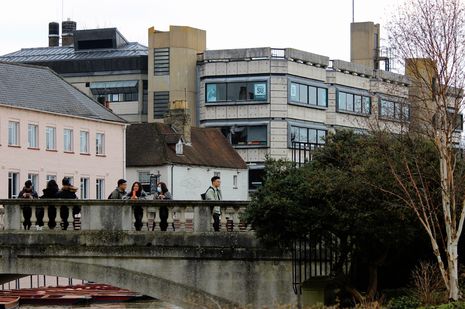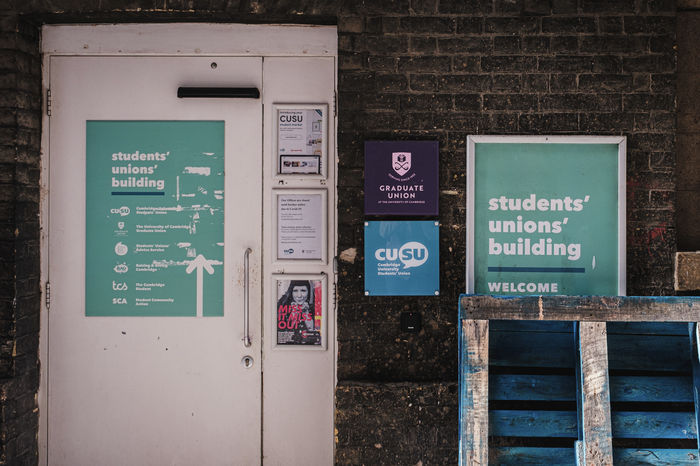The SU is floundering, and I’m not that bothered
Matthew Taylor reflects on the recent failings of the SU, arguing that student activism can be just as effective without the tired old middleman

The email notification on Friday Night about the Extraordinary Student Members’ Meeting came through as I was having a post-exam lager in Selwyn bar. My curiosity was initially piqued though it is safe to say I was underwhelmed when I discovered what was sitting in my inbox. I swiftly turned my phone off and returned to the conversation without giving the SU a second thought. This attitude towards the announcement can be epitomised by the response of students to the two Camfesses that concern themselves with it: Camfession40716 calls for students to turn up to the meeting to make it quorate (giving votes legitimacy because enough students participate), while Camfession40711 asks “Why’d I think the SU was calling me an extraordinary student.” At the time of writing, the former has five likes and the latter one-hundred and twenty-three.
“The SU is in a torpid state and rebellion could be just the thing to wake it from hibernation”
Let’s take a look at all the failings of the SU lately. Casting our minds back to manifestos of previous years – no progress has been made on the infamous reading week despite the University’s admission that students face an “excessive workload,” nor has anything seem to have come of the vote that sought to make the University Catering Service vegan. More recently, the SU sat quietly as the Crane fund announced it would no longer support ADHD and autism diagnoses, no doubt made easier by the fact that come March, the SU did not have a disabilities officer. This vacant position can be understood as part of a larger trend of late in which the SU seems to be falling in on itself: a recent Varsity investigation has found evidence of racism, nepotism, and bullying at play in the institution. The fact that three Women’s Officers have resigned in two years speaks to a “misogyny” that seems to pervade the SU such that there are no longer any non-male sabbatical officers. In the past two weeks things have escalated further – the postgraduate president went on hunger strike the same day Harvey Brown became the fourth sabbatical officer to resign this academic year, leaving the sabbs at half capacity.
“An optimist might argue that it is our responsibility to reinvigorate the SU, but I’m struggling to keep my apathy at bay”
Brown’s resignation, it seems to me, gets to the root of the issue: the SU has failed to engage with the Cambridge for Palestine encampment and, in the words of Brown, is “fragrantly disconnected from student movements”. Attempts to rectify this, in the form of pro-Palestine efforts from sabbs have suffered under the SU’s purported “impartiality,” which seems to be enforced by senior management on a case-by-case basis to prevent repercussions from their biggest funding source – the University. In the case of support for Palestine, the SU undoubtedly went too far when it forbade political campaigns it helps fund, such as Gender Agenda, from endorsing a student movement because of its political nature. That there is a culture of fear and a desire not to upset the University is unsurprising when sabbatical officers are salaried, but I have to wonder what the SU thinks it has to lose in being so avoidant – it is not as if students are engaged, or that the elected officers have much of a mandate anyway, with only 11.9% of students having turned out to vote last year. The SU is in a torpid state and rebellion could be just the thing to wake it from hibernation.
Do excuse my negativity, but it is difficult not to be so when the only tangible impact one can see from the SU is the refilling of college welfare boxes with contraceptives; even then, there was a supply issue last year leading to a state of condomlessness among colleges that persisted for an inexplicably long time. An optimist might argue that it is our responsibility, as students, to reinvigorate the SU once more, to advocate for “its magnificent revival” as Gender Agenda put it, but I’m afraid to say I’m struggling to keep my apathy at bay. The SU’s current strategic direction, for example, sets out that by 2025, it will seek for 60% of students to “see the SU as effectively providing support to students who want to make change, including; tackling issues of injustice and inequality”. It doesn’t seem very likely, does it?
Over the past month we as a student population have demonstrated the extent to which student activism can succeed and mobilise without the support of institutions like the SU. The encampment has not struggled to garner support and it has cut out the tired old middleman when it comes to negotiations with the Uni. Amplifying students’ voices, as an SU should seek to do, ought not come second to unnecessary bureaucracy. I’m not advocating for the abolishment of the SU: in principle, I’d much rather have a formal mechanism through which my wishes can be relayed to University governance than not, but the SU has been failing to do that effectively for a while now.
I hope the SU can sort itself out, but I won’t be losing sleep over it. For collegiate issues, JCRs seem to at least be somewhat functional, and for matters concerning the whole University, students have demonstrated an ability to advocate for themselves. If Cambridge for Palestine held a vote which required in-person participation, I guarantee they would not have to worry about it being quorate or not, which tells me everything I need to know about where to put my time and effort when engaging in student politics.
 News / Cambridge academics stand out in King’s 2026 Honours List2 January 2026
News / Cambridge academics stand out in King’s 2026 Honours List2 January 2026 Interviews / You don’t need to peak at Cambridge, says Robin Harding31 December 2025
Interviews / You don’t need to peak at Cambridge, says Robin Harding31 December 2025 Comment / What happened to men at Cambridge?31 December 2025
Comment / What happened to men at Cambridge?31 December 2025 News / Varsity’s biggest stories of 202531 December 2025
News / Varsity’s biggest stories of 202531 December 2025 Features / “It’s a momentary expression of rage”: reforming democracy from Cambridge4 January 2026
Features / “It’s a momentary expression of rage”: reforming democracy from Cambridge4 January 2026










